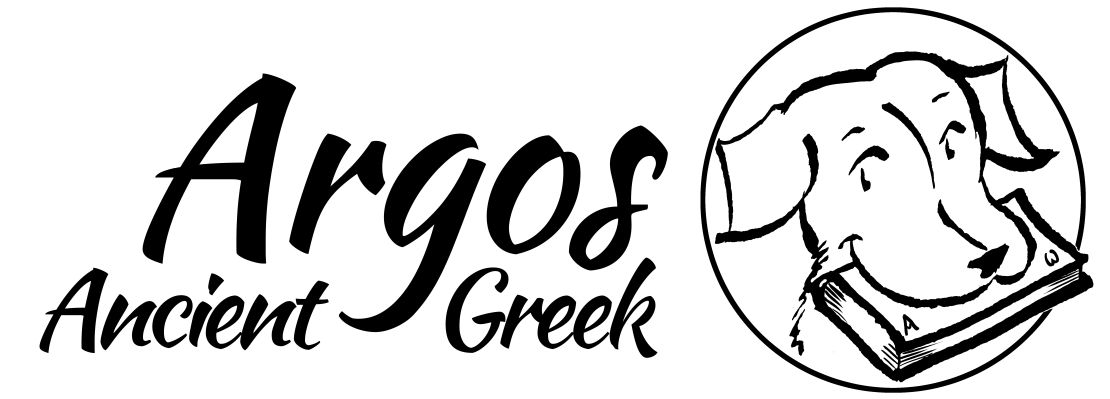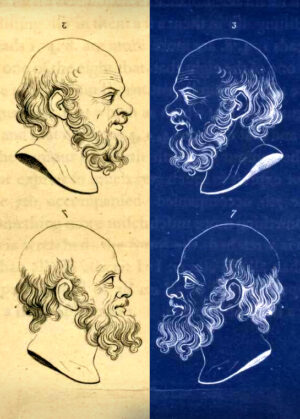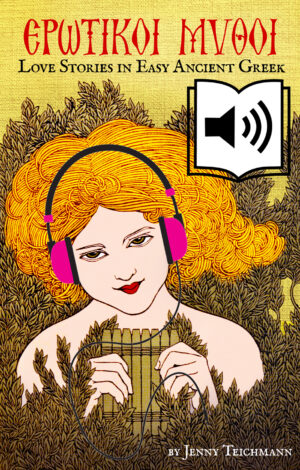
Lucian’s Dream / Περὶ τοῦ ἐνυπνίου (Audiobook)
25,00 €
Learn Ancient Greek with the “Douglas Adams” of antiquity!
Why read Lucian?
Lucian is a great author for intermediate to advanced learners of Ancient Greek. If you want to read an accessible text but are not so thrilled by all the “parasangs” in Xenophon’s Anabasis, then Lucian is your man!
Lucian’s prose is…
❦ witty,
❦ concise and clear,
❦ dealing with daily life and absurd fantasy at the same time.
You can find more reasons on why to read Lucian in this blog post: “Read Lucian, Guys, the Douglas Adams of Ancient Greek”
Who was Lucian?
Lucian was the top orator of his time. Born c. 125 AD in Greek speaking Syria, he became famous for his witty, sarcastic style and made his living as a travelling author, visiting cultural hot spots of the Roman Empire where he would read from his works to a live audience. He was the TEDx star of his age, a successful entertainer and educator at the same time.
What is Lucian’s “Dream” about?
Lucian tells us about the most important decision of his life: He was a teenager and had to choose whether to follow in the footsteps of his ancestors and become a stone carver (λιθοξόος) or whether to choose the road less traveled by: higher education (παιδεία) and becoming an orator. But then, in the midst of this big decision, he has a mysterious dream…
Level
Intermediate to Advanced
Preview
Περὶ τοὺ ἐνυπνίου, ἤτοι· Βίος Λουκιανοῦ
“ἄρτι μὲν ἐπεπαύμην εἰς τὰ διδασκαλεῖα φοιτῶν ἤδη τὴν ἡλικίαν πρόσηβος ὤν, ὁ δὲ πατὴρ ἐσκοπεῖτο μετὰ τῶν φίλων ὅ τι καὶ διδάξαιτό με. τοῖς πλείστοις οὖν ἔδοξεν παιδεία μὲν καὶ πόνου πολλοῦ καὶ χρόνου μακροῦ καὶ δαπάνης οὐ μικρᾶς καὶ τύχης δεῖσθαι λαμπρᾶς, τὰ δ᾽ ἡμέτερα μικρά τε εἶναι καὶ ταχεῖάν τινα τὴν ἐπικουρίαν ἀπαιτεῖν…”
The Dream, or: Lucian’s Life
“I had recently stopped going to school, being a teenager already, so my father deliberated together with his friends what he wanted me to be educated in next. To most of them it seemed that higher education would require a lot of work and a long time and quite some expenses and an outstanding social position, whereas our means were small and would require some fast help…”
Why Ancient Greek Audiobooks?
Listening is an important skill to master with any language but is often neglected by students of “dead” languages. The reasoning goes something like this: Ancient Greek is transmitted only through texts, so why should I bother with listening or speaking if my end goal is just to read it? In my experience, students who focus exclusively on reading end up not being able to read (yes, that’s the irony). They might be able to analyze a text (“Here is the main verb, there is the subject…”) but they can’t just open a book in Ancient Greek and read it as they would read a book in their mother tongue. So, if you are content with merely analyzing Ancient Greek texts, you don’t need audiobooks. If, on the other hand, you see Ancient Greek as a language, not a Sudoku puzzle, I would recommend that you take a more holistic approach and give listening a try. Here are some benefits of audiobooks for learners of Ancient Greek:
❦ Learn to understand Greek intuitively: Listening forces you to understand a sentence as it naturally unfolds, word for word. You don’t have time to “look for the main verb”, but you are forced to take in information as it comes, one word at a time, just like the ancients themselves would have done.
❦ Learn in context: Learning words in context is more effective than trying to memorize lists of unrelated words. Narrations from an audiobook are giving you the associations needed to store words in your long-term memory.
❦ Make repetition easy: Almost all learning is based on repetition. Repeatedly listening to an easy text you understand will help you remember vocabulary without having to actively memorize it.
❦ Learn on the go: You don’t have time today to sit down and study Ancient Greek? No problem, you can just put on your headphones and listen to an Ancient Greek audiobook wherever you go, whether you are commuting, doing household chores, or walking the dog. I do this myself with all languages I learn and can highly recommend this approach (it also results in a tidier house if the things I am listening to are so intriguing that I don’t want to stop doing chores—win win!).
For a student’s view on the benefits of audiobooks, take a look at this blog post by my student Lee: Don’t Just Read Ancient Greek, Listen, too!
Further Information
Read by Jenny Teichmann
File format: mp3 / Duration: 23:30 minutes
After your purchase you can download a ZIP file that contains the audiobook. You will need to unpack the ZIP file before you can listen to the mp3.
Lucian. Works. with an English Translation by. A. M. Harmon. Cambridge, MA. Harvard University Press. London. William Heinemann Ltd. 1921. 3.
(Available on Perseus.)
Erasmian, with an (attempted) emphasis of long vs short syllables.
After you have paid you will receive an email with the download link: Just click the link and your download will start.
The download link expires after 14 days. You will need to download your purchased file before the link expires.
If you have any problems or questions, you can contact: info@argos-didaskei.com



